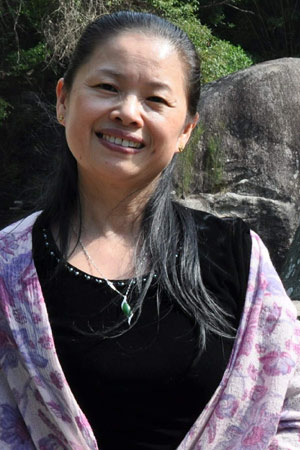Life
Royal ties that bind
By Hu Meidong and Wei Tian (China Daily)
Updated: 2010-12-29 07:53
 |
Large Medium Small |
|
 Xu-Shi Yin'e meets the Prime Minister of Sri Lanka D. M. Jayaratne at the Shanghai Expo. |
The missing links of ancient Ceylon's imperial family are to be found in a coastal city of Fujian province. Hu Meidong and Wei Tian report
Since Xu-Shi Yin'e was a little girl, she has been aware that her family was different. "My grandma was always mumbling something about our ancestors coming from faraway lands; the ancestral tablets in the family shrine were inscribed with words in a strange foreign language that no one recognized," says the 47-year-old, who resides in Quanzhou, a costal city of East China's Fujian province.
|
 Despite being in the public eye, Xu-Shi Yin'e tries to lead the life of an ordinary citizen, just like her royal ancestor did 500 years ago. Photos provided to China Daily |
"Even more bizarre, our family name came with two words while most others' only had one."
Xu-Shi's curiosity was not satisfied until she was 16, when her father who emigrated to the Philippines, left her with an astonishing truth which she was asked never to reveal, not even to her historian husband.
Had it not been for the likely damage to an ancient tomb, the truth would probably have never come out.
In 1996, a local newspaper published an account of an archeological discovery of a Ceylon (today's Sri Lanka) prince's tomb in Quanzhou. Two years later, when the area was once again mentioned in the media in relation to a redevelopment plan, Xu-Shi felt it was time for her to step up.
"I could not keep the secret anymore," she says. "Compared with breaking the promise made to my father, sitting back and seeing our ancestral grave being bulldozed seemed like a much worse sin."
She contacted local media, calling for protection of the ancestral grave. For the first time, she revealed her relationship to the person entombed, unveiling a centuries-old history of the Ceylon "royal family" in China.
Some 500 years ago, the Crown Prince of Ceylon, who came to China as an emissary with navigator Zheng He's fleet in the Ming Dynasty (1368-1644), was forced to stay in Quanzhou after his nephew usurped the throne on the death of the king.
To escape detection and possible execution, the prince decided to live incognito by changing his name to "Shi" and settle down in Quanzhou as an ordinary citizen.
He was buried in Quanzhou and his tomb was carefully watched over by family members until the 1960s.
"For centuries our family lived a low-profile life of peace," says Xu-Shi, the 18th generation descendant of the royal family.
"Change came during my great-great-grandmother's time. As there were no sons, a man surnamed Xu married into our family, which changed the family name to Xu-Shi."
With the dawn of the 20th century, the family was confronted with bigger challenges.
While some members moved abroad, Xu-Shi's grandfather remained in the country.
Having overseas relations was a mixed blessing for the family in the next few decades. While relatives helped them with food and money during difficult times in the 1960s, it also meant trouble during the "cultural revolution" (1966-1976).
"Grandmother had to burn all the family-tree records to avoid possible accusation of 'having illicit foreign relations'," Xu-Shi says.
"But one thing she would not let go was a figure of Buddha (a family heirloom that was a gift from the Chinese emperor). She hid it beneath her clothes for months."
After multiplying for five centuries, Xu-Shi's family have forgotten their mother tongue long ago, and their Sinhalese facial features too have faded. But the family remains devoutly Buddhist, the only remnant of their Ceylonese inheritance.
Ever since revealing her identity, Xu-Shi has been under the spotlight.
In 2002, she was invited to Sri Lanka and welcomed with royal etiquette.
In 2010, she was received by the Prime Minister of Sri Lanka D. M. Jayaratne, at the Shanghai Expo.
Xu-Shi now runs an antique shop on the most prosperous street in Quanzhou. Despite being in the public eye, she tries to lead the life of an ordinary citizen, just like her royal ancestor did 500 years ago.
"My biggest wish at the moment is to visit Sri Lanka again in 2011," she says.
"Not as a princess, but as a Buddhist to obey the summons of the 6th World Buddhist Council in 2,600 years."